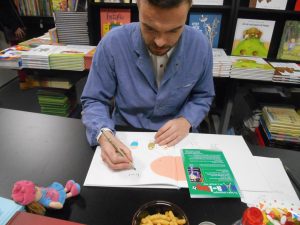If you know me, you wil be aware that I am always on the look out for authentic stories, orginally written in French. However when I occasionally see a very good translation of a story in another language, I cannot resist it either!
I came across this book at the Salon du Livre et de la Presse Jeunesse in Montreuil in November 2016 where I met its author from Northern Ireland, Oliver Jeffers. Here he is signing my book. I knew of him because I also own the lovely “Perdu? Retrouvé!”.
Find out more about “C’est lui!” in this short video!

Language of text: French
Type of text: picture book
Author or source: Oliver Jeffers
Intended age of students: Key Stage 2/3
Source reference: 9782877677912
Either the children will already know the useful phrases listed below, or at least some of them, and this story will reinforce their knowledge of them, or I willl teach some of them to the children before I read the book so they can take part and understand what is going on.
After the pupils are familiar with the story, they can re-enact it, which they will love to do of course. If they know or have just learnt any other phrases to agree, disagree and allocate blame, they can include those in their role-plays too.
Rationale:
I like this book because it will help encourage the children to use everyday phrases in their lessons, in order to say when they agree, don’t agree and to allocate blame. They will have fun doing it and, if encouraged, it will become spontaneous to them.
Outcomes:
Children (and adults!) dream of being able to communicate naturally in a foreign language. Thanks to this story and the phrases the children will pick up from it, they will be one step closer to that goal.
As a follow up activity, the pupils could each come up with 5 extra phrases they would like to know in French; they could then look them up or have a vote as a class on the ones they all want to know, which you could share with them.
Topics or themes:
It encourages spontaneous speaking.
It also reminds children that it is just best to get on; a lot of the time people don’t even know what they are arguing about!
Grammar:
emphatic pronouns; if you are working on pronouns, this story will go beautifully with “C’est à moi, ça!”.
Strategies:
Useful words and phrases: être d’accord, c’est lui, c’est pas moi, le culot, furax, bouche-bée, j’ai oublié
Also: pourquoi, pour quelle raison
How much time required: 1 lesson
You can watch my short vlog about the story here!
I did recommend it for older pupils… then I went into my Tuesday school and the teacher was looking for an idea for a short play that his Y4 pupils (8 and 9 year olds) about friendships… So I recommended this story and he is going to use it! Pupils of any age would like to be able to argue with their peers in French I am quite sure!!
What is your favourite Oliver Jeffers book, in English or in French?

